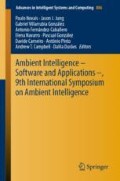Abstract
Emotion recognition has become an important area of study for the development of human-machine interfaces able to recognize and interpret human emotions. In order to construct emotional systems, signals from physiological variables have to be registered and processed rapidly to provide a fast emotional response from the computer system to the user. In this regard, several studies have claimed that nonlinear methodologies applied to electroencephalographic signals can provide relevant information about emotions recognition. However, given the multimodal nature and nonlinear behaviour of that signals, the data processing is often very slow to give a fast response, producing an important delay between feeling an emotion and receiving the adequate response from the emotional system. In order to overcome this difficulty, this work computes a modification of quadratic sample entropy accelerating the computation by exploiting vectors with dissimilarity.
Access this chapter
Tax calculation will be finalised at checkout
Purchases are for personal use only
References
Picard, R.W.: Affective Computing. MIT Press, Cambridge (1995)
García-Martínez, B., Martínez-Rodrigo, A., Zangróniz, R., Pastor, J.M., Alcaraz, R.: Symbolic analysis of brain dynamics detects negative stress. Entropy 19(5), 196 (2017)
Jenke, R., Peer, A., Buss, M.: Feature extraction and selection for emotion recognition from EEG. IEEE Trans. Affect. Comput. 5(3), 327–339 (2014)
Abásolo, D., Hornero, R., Gómez, C., García, M., López, M.: Analysis of EEG background activity in alzheimer’s disease patients with lempel-ziv complexity and central tendency measure. Med. Eng. Phys. 28(4), 315–22 (2006)
García-Martínez, B., Martínez-Rodrigo, A., Zangróniz Cantabrana, R., Pastor García, J., Alcaraz, R.: Application of entropy-based metrics to identify emotional distress from electroencephalographic recordings. Entropy 18(6), 221 (2016)
Richman, J.S., Moorman, J.R.: Physiological time-series analysis using approximate entropy and sample entropy. Am. J. Physiol.-Hear. Circ. Physiol. 278(6), H2039–49 (2000)
Pan, Y.-H., Wang, Y.-H., Liang, S.-F., Lee, K.-T.: Fast computation of sample entropy and approximate entropy in biomedicine. Comput. Methods Programs Biomed. 104(3), 382–396 (2011)
Manis, G.: Fast computation of approximate entropy. Comput. Methods Programs Biomed. 91(1), 48–54 (2008)
Shimizu, S., Sugisaki, K., Ohmori, H.: Recursive sample-entropy method and its application for complexity observation of earth current. In: 2008 International Conference on Control, Automation and Systems, ICCAS 2008, pp. 1250–1253. IEEE (2008)
Bo, H., Fusheng, Y., Qingyu, T., Chan, T.-C.: Approximate entropy and its preliminary application in the field of EEG and cognition. In: 1998 IEEE Proceedings of the 20th Annual International Conference of the Engineering in Medicine and Biology Society, vol. 4, pp. 2091–2094. IEEE (1998)
Yun, L., Wang, M., Peng, R., Zhang, Q.: Accelerating the computation of entropy measures by exploiting vectors with dissimilarity. Entropy 19(11), 598 (2017)
Koelstra, S., Mühl, C., Soleymani, M., Lee, J.-S., Yazdani, A., Ebrahimi, T., Pun, T., Nijholt, A., Patras, I.: DEAP: a database for emotion analysis using physiological signals. IEEE Trans. Affect. Comput. 3(1), 18–31 (2012)
Acknowledgements
This work was partially supported by Spanish Ministerio de Economía, Industria y Competitividad, Agencia Estatal de Investigación (AEI)/European Regional Development Fund (FEDER, EU) under DPI2016-80894-R and AEI TIN2015-72931-EXP grants, and by the Centro de Investigación Biomédica en Red de Salud Mental (CIBERSAM) of the Instituto de Salud Carlos III. Beatriz García-Martínez holds FPU16/03740 scholarship from Spanish Ministerio de Educación, Cultura y Deporte. Arturo Martínez-Rodrigo holds EPC 2016-2017 research fund from Escuela Politécnica de Cuenca, Universidad de Castilla-La Mancha, Spain.
Author information
Authors and Affiliations
Corresponding author
Editor information
Editors and Affiliations
Rights and permissions
Copyright information
© 2019 Springer Nature Switzerland AG
About this paper
Cite this paper
Martínez-Rodrigo, A., García-Martínez, B., Fernández-Caballero, A., Alcaraz, R. (2019). Testing a New Methodology for Accelerating the Computation of Quadratic Sample Entropy in Emotion Recognition Systems. In: Novais, P., et al. Ambient Intelligence – Software and Applications –, 9th International Symposium on Ambient Intelligence. ISAmI2018 2018. Advances in Intelligent Systems and Computing, vol 806. Springer, Cham. https://doi.org/10.1007/978-3-030-01746-0_30
Download citation
DOI: https://doi.org/10.1007/978-3-030-01746-0_30
Published:
Publisher Name: Springer, Cham
Print ISBN: 978-3-030-01745-3
Online ISBN: 978-3-030-01746-0
eBook Packages: Intelligent Technologies and RoboticsIntelligent Technologies and Robotics (R0)

